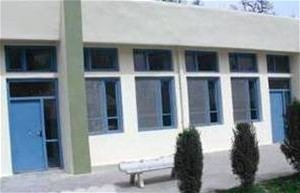
The newly renovated Nangarhar Teacher Training Institute building.
USAID/CADG
USAID employs poor women to rehabilitate and repair buildings at the Nangarhar Teacher Training Institute.
11 OCTOBER 2010 | JALALABAD, AFGHANISTAN
Over the course of many years, thousands of prospective teachers, predominantly women, have been trained at the Nangarhar Teacher Training Institute, elevating the educational and social status of women and improving the quality of education throughout Afghanistan. However, over time, the Institute’s building fell into disrepair. At the same time, another serious issue plagued Nangarhar: the province is home to many unemployed widows and destitute women who have no option other than begging to support their families. USAID acted to address these two issues simultaneously by hiring local widows to repair and rehabilitate the Institute’s buildings.
In partnership with the Afghan Department of Social Affairs, Department of Women’s Affairs, and the Directorate of the Nangarhar Teacher Training Institute, USAID’s Food Insecurity Response to Urban Populations (FIRUP) project employed 37 women and six men to rehabilitate the building. For two months, workers repaired wiring, installed new doors, replaced broken locks and windows, and plastered and painted offices, the library, classrooms, and the building’s exterior. The workers also cleaned the science laboratory annexes, plastered three laboratories, and landscaped the school grounds.
This project, the first of its kind in Jalalabad, has made a noticeable difference in the lives of the female laborers. Forty-five year old Nazer, a widow from Beshood District supporting a family of eight, explained, “With my wages, I can now buy much needed medicine for my sons, as well as food for my family.” Thirty-five-year-old Tajek from Kama, who is supporting 10 family members, stated, “Before this project, my little children had to work to provide for us all, but now they can go to school.” The project also made a difference for future teachers who will receive training at the Institute. The Institute’s director, Farman Ullah Helaman, voiced his support for this pilot program and its approach to providing a secure and sanitary environment in which to train prospective teachers.
USAID’s FIRUP program promotes stability through temporary employment and income-generation opportunities in targeted populations to reduce the number of food-insecure and/or unemployed Afghans who might otherwise turn to the insurgency or other illicit activities for income.







Comment
Make a general inquiry or suggest an improvement.